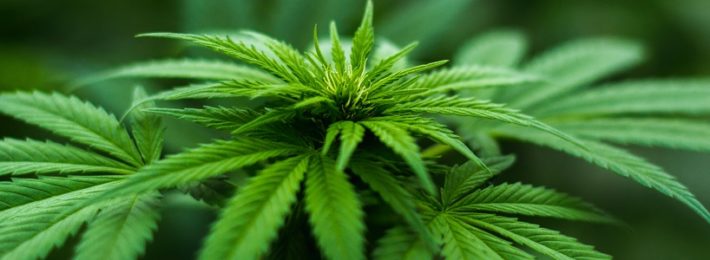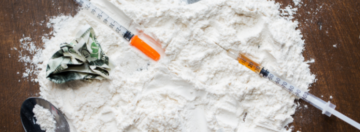Beware of Using Marijuana Extracts

More than a year ago, the Drug Enforcement Administration (DEA) added marijuana extracts to its list of Schedule 1 drugs. Schedule 1 drugs, substances, or chemicals are defined as drugs with no currently accepted medical use and a high potential for abuse. Cannabidiol (CBD) and CBD oils are considered extracts. These types of products and their use are becoming more and more prevalent. CBD products are used for a variety of purposes, including massage oils, treatments by chiropractors and other wellness providers, and even some beauty products. Be a savvy consumer and check labels to ensure the product you’re using doesn’t contain CBD extracts. Ask massage therapists up front if they are using CBD products in their services.
Many have asked why CBD extracts are considered a Schedule 1 drug when they don’t contain THC. This was determined by the Drug Enforcement Administration who state that even products labeled THC free can contain THC up to 7% depending on the state. The DEA website states: “As the scientific literature indicates, cannabinoids, such as tetrahydrocannabinols (THC), cannabinols (CBN) and cannabidiols (CBD), are found in the parts of the cannabis plant that fall within the CSA definition of marijuana, such as the flowering tops, resin, and leaves.” For those not familiar with some of the street names for marijuana concentrates here are a few: 246; BHO; Badder; Budder; Butter; Dabs; Ear Wax; Errl; Honey Oil; SAP; Shatter; and Wax.
As a reminder, the Federal Government prohibits the use of Schedule 1 drugs, so regardless of state and local laws, federal employees and contractors are prohibited from using them. This is especially true for all of you clearance holders or future applicants.



Timely information, as CBD oils are becoming extremely popular, even among medical and mental health professionals. Even thought the THC levels are low enough to be touted as ‘non-existant’, be aware that they can still be detected by test panels, especially since the oil is very vulnerable to other substances that have an amplifying effect.
Someone I know well was recommended a CBD oil capsule as a natural anxiety remedy instead of a prescription medicine. This CBD brand was expensive, made from organic hemp, had third party lab confirmation as being pure, etc. and having maximum of 1% THC content.
A urine drug screen for pre employment showed positive for marijuana. I have zero doubt that this person has never been in contact with marijuana in their lifetime.
After lots of research, it was determined that another supplement (5-HTP) that was also being taken ‘amplified the body’s’ chemical ‘identity’ of hemp to show as THC containing hemp’.
Needless to say, even with refuting information, the employer withdrew the offer.
Do clearance investigators know if you have a medical marijuana card if you do not disclose it?
I doubt it but I don’t think that, right now, you can clear while using medical marijuana. It’s still illegal federally. There is no medical exception.
Failure to disclose this is a valid reason for denial or revocation if discovered.
No, there is no way for them to check. However, I would not be surprised if Continuous Evaluation programs eventually get hooked into State medical marijuana registries to run matches on clearance holders. Even now agencies have select personnel that have access to registries and can run checks when information is gleaned that someone may be using medical marijuana. If you are thinking about not disclosing marijuana use (medical or otherwise) then you probably shouldn’t apply for a federal or contractor position.
A 20 year Fed friend got his mmj card then canceled it a year later once he realized his mistake. Either way, he will be fired. Correct? So, he basically has no other choice otherwise he will lose his job.
I can’t say that he will be fired . . . If he self reported when he “realized” his mistake, he should have a chance to save his job. However, he might have a difficult time convincing anyone who matters that he didn’t realize that what he was doing was a problem. If he didn’t report and is discovered, he’s done.
So, there is a way for them to check. I have been told countless times that they can and can’t find out. I just want to be able to end the debate.
Hello, I saw your posts on a few posts I was looking up.
My friend is a current federal employee in financial management in a public trust position.
They had a panic attack over the weekend and went to the hospital, the hospital did a routine drug test and they tested positive for THC.
It was from a Cbd delta 8 gummie (hemp) and not marijuana. But the drug tests only test for thc not the different types. This was done in the ER.
They are freaking out thinking they are going to be fired over it, every 5 years they do complete an sf-85p for their background check and it does mention drug use.
What would be the best course of action for them and likelihood of termination? Would it be best to report now or wait for the new review and admit then?
Since the drug test was done at the ER would they even pull that record?
Hey . . . The test isn’t likely to show up anywhere that they would look for it on a reinvestigation. But, if he fails to report or lies about it, then he has TWO problems instead of one and, in fact, the dishonesty is worse than the one-time, accidental drug use.
And, it WAS drug use. The source doesn’t matter in the least. That’s the problem all the CBD and other crap. In theory, CBD isn’t supposed to have ANY THC but that’s not usually the case. Anyone who tells you otherwise is lying and THC is THC no matter the source. I have little compassion for those who get caught in this way because they just aren’t paying attention to either the clearance or their life.
Now, this isn’t a serious as it was even five years ago. People are being cleared with all sorts of past drug use. Drug use while cleared is more serious but still survivable.
I would recommend self-reporting and here’s why. If they do not self-report, they will be asked about drug use on their next investigation. If they answer truthfully, they will have a problem because they didn’t report it now. If they lie in the future, as noted above, they are committing another, worse, infraction. The odds of getting caught after that are slim but it’s going to be over their head for the rest of their career.
Public Trust is less stringent than some other clearances so their chances of surviving all off this are pretty good.
I hope that helps your friend . . .
Ed
I really appreciate your response, I told him he should contact his security officer and just explain what happened.
It does show up on the medical record from the ER visit as “marijuana” which is funny since its THC from hemp and just doesn’t say THC.
I think honesty is the best policy especially being a one off and open about it.
I think it’s a good chance they get let go, but that’s just me and I’m clueless.